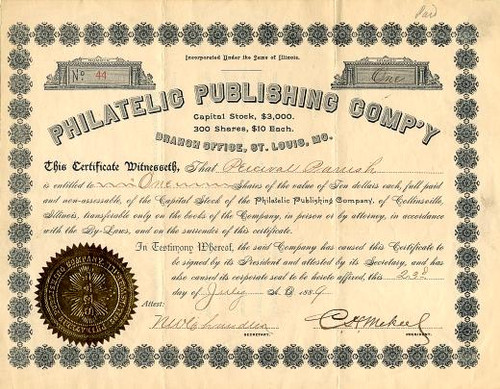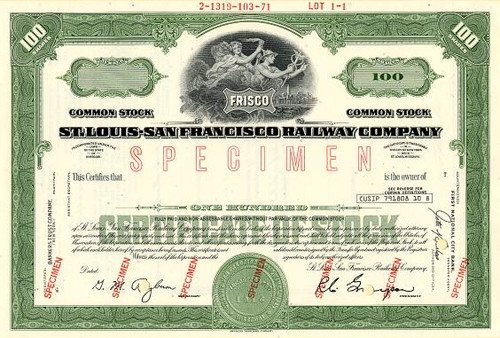Beautiful certificate from the Press Publishing Company issued no later than 1915. This historic document was printed by Ketcham Banknote Company and has an ornate border around it. This item has the signatures of the Company's President, Ralph Pulitzer and Secretary and is over 105 years old. The certificate was issued to Joseph Pulitzer Jr and signed by him. 
Joseph Pulitzer Jr Signature Ralph Pulitzer (18791939) gained control of the World, which was acquired by Scripps-Howard for US$5 million in 1931 and became the World-Telegram. Joseph Pulitzer II (1885-1955) retained the St Louis Post-Dispatch. Pulitzer, Joseph (poo'litsur, pyOO'), 18471911, American newspaper publisher and politician, b. Hungary. He emigrated to the United States in 1864, served a year in the Union army in the Civil War, and became a journalist on the Westliche Post, a German-language newspaper. In 1869 he was elected to the Missouri legislature, where he earned a reputation as a liberal reformer. As owner and publisher after 1878, he made the St. Louis Post-Dispatch a successful paper. In 1883 he bought the New York World from Jay Gould. Pulitzer's aggressive methods of building up this paper, its Sunday issue, and the Evening World (started 1887) included the use of illustrations, news stunts, crusades against corruption, and cartoons, as well as aggressive news coverage. William Randolph Hearst established his New York Journal in 1895 to vie with Pulitzer's papers in sensationalism and in circulation. The ensuing contest, with its banner headlines, lavish pictures, emotional exploitation of news--in short, "yellow journalism"--reached notorious heights in the treatment of the Spanish-American War. Later the World became more restrained and the outstanding Democratic organ in the United States, although it sometimes opposed party policies. In 1885, Pulitzer was elected to the U.S. House of Representatives, where he served briefly. After 1890 partial blindness kept Pulitzer from the editorial offices, but he directed his papers no less closely than before. He left funds to found what is now the graduate school of journalism at Columbia Univ. and endowed the Pulitzer Prizes. In 1931, Pulitzer's sons, Ralph (18791939) and Joseph (18851955), sold the New York papers to the Scripps-Howard chain, and the Evening World was merged with the New York Telegram. The Post-Dispatch, under his son Joseph and then under his grandson Joseph Pulitzer (191393), was cited repeatedly for outstanding journalism and public service. Its editorial page maintained the Pulitzer tradition of independent liberalism.
Joseph Pulitzer Jr. (1913 - 1993) was a U.S. newspaper editor and publisher. He was the son of Joseph Pulitzer. Joseph Pulitzer (April 10, 1847 October 29, 1911) was a Hungarian-American publisher best known for posthumously establishing the Pulitzer Prizes and (along with William Randolph Hearst) for originating yellow journalism. Pulitzer was born in Makó, Hungary, Pulitzer (IPA pronunciation: sought a military career, but was turned down by the Austrian army for frail health and poor eyesight. He emigrated to the United States in 1864 to serve in the American Civil War. After the war he settled in St. Louis, Missouri, where in 1868 he began working for a German-language daily newspaper, the Westliche Post. He joined the Republican Party and was elected to the Missouri State Assembly in 1869. In 1872, Pulitzer purchased the Post for $3,000. Then, in 1879, he bought the St. Louis Dispatch for $2,700 and merged the two papers, which became the St. Louis Post-Dispatch, which remains St. Louis' daily newspaper. It was at the Post-Dispatch that Pulitzer developed his role as a champion of the common man with exposés and a hard-hitting populist approach. In 1882 Pulitzer, by then a wealthy man, purchased the New York World, a newspaper that had been losing $40,000 a year, for $346,000 from Jay Gould. Pulitzer shifted its focus to human-interest stories, scandal, and sensationalism. In 1885, he was elected to the U.S. House of Representatives, but resigned after a few months' service. In 1887, he recruited the famous investigative journalist Nellie Bly. In 1895 the World introduced the immensely popular The Yellow Kid comic by Richard F. Outcault, the first newspaper comic printed with color. Under Pulitzer's leadership circulation grew from 15,000 to 600,000, making it the largest newspaper in the country. The editor of the rival New York Sun attacked Pulitzer in print, calling him in 1890 "The Jew who abandoned his religion". This was intended to alienate Pulitzer's Jewish readership. Pulitzer's already failing health deteriorated rapidly and he withdrew from the daily management of the newspaper, although he continued to actively manage the paper from his vacation retreat in Bar Harbor, Maine, and his New York mansion. In 1895, William Randolph Hearst purchased the rival New York Journal, which led to a circulation war. This competition with Hearst, particularly the coverage before and during the Spanish-American War, linked Pulitzer's name with yellow journalism. After the World exposed a fraudulent payment of $40 million by the United States to the French Panama Canal Company in 1909, Pulitzer was indicted for libeling Theodore Roosevelt and J. P. Morgan. The courts dismissed the indictments in a victory for freedom of the press. In 1892, Pulitzer offered Columbia University's president, Seth Low, money to set up the world's first school of journalism. The university initially turned down the money, evidently unimpressed by Pulitzer's unscrupulous character. In 1902, Columbia's new president Nicholas Murray Butler was more receptive to the plan for a school and prizes, but it would not be until after Pulitzer's death that this dream would be fulfilled. Pulitzer left the university $2 million in his will, which led to the creation in 1912 of the Columbia University Graduate School of Journalism, but by then at Pulitzer's urging the Missouri School of Journalism had been created at the University of Missouri. Columbia's Graduate School of Journalism remains one of the most prestigious in the world. Joseph Pulitzer died aboard his yacht in the harbor of Charleston, South Carolina in 1911. He is interred in the Woodlawn Cemetery in The Bronx, New York. In 1917, the first Pulitzer Prizes were awarded, in accordance with Pulitzer's wishes. In 1989 Pulitzer was inducted into the St. Louis Walk of Fame. A fictionalized version of Joseph Pulitzer is portrayed in the 1992 Disney film musical, Newsies. HARVARD LAW REVIEW Vol.. XLIV MAY, 1931 No. 7 DEVIATION FROM THE TERMS OF A TRUST JOSEPH PULITZER, the founder of the New York World, died in 1911, bequeathing shares of stock of the Press Publishing Company which published the World newspapers, and of the Pulitzer Publishing Company which published the St. Louis Post-Dispatch, to his three sons in trust during the lives of the two younger sons to pay the income to the three sons and to certain others. On the termination of the trust the shares of stock were to be divided among various descendants. The testator authorized the trustees in their discretion to sell the stock in the Pulitzer Publishing Company, but provided that this power of sale should not be taken to authorize the sale under any circumstances whatever of the stock of the Press Publishing Company. The trustees brought a proceeding seeking the instructions of the court as to the propriety of selling the newspaper properties owned by the Press Publishing Company, a contract of sale having been made subject to the approval of the court. It was proved that for several years the publication of the World had resulted in large and increasing losses and that the reserves had so declined that they would not permit of its continued publication for more than three months. The Surrogate held that the trustees had authority to sell the property, although he refused to pass upon the proposed contract, since it was a contract of the publishing company rather than of the trustees themselves.It is to be noted that the sale was not a sale of the stock of the publishing company but a sale of the assets of the company. The trustees did not hold in trust all the shares of the company, but the remaining shares were owned by them personally.

Joseph Pulitzer Jr Signature
Joseph Pulitzer Jr. (1913 - 1993) was a U.S. newspaper editor and publisher. He was the son of Joseph Pulitzer. Joseph Pulitzer (April 10, 1847 October 29, 1911) was a Hungarian-American publisher best known for posthumously establishing the Pulitzer Prizes and (along with William Randolph Hearst) for originating yellow journalism. Pulitzer was born in Makó, Hungary, Pulitzer (IPA pronunciation: sought a military career, but was turned down by the Austrian army for frail health and poor eyesight. He emigrated to the United States in 1864 to serve in the American Civil War. After the war he settled in St. Louis, Missouri, where in 1868 he began working for a German-language daily newspaper, the Westliche Post. He joined the Republican Party and was elected to the Missouri State Assembly in 1869. In 1872, Pulitzer purchased the Post for $3,000. Then, in 1879, he bought the St. Louis Dispatch for $2,700 and merged the two papers, which became the St. Louis Post-Dispatch, which remains St. Louis' daily newspaper. It was at the Post-Dispatch that Pulitzer developed his role as a champion of the common man with exposés and a hard-hitting populist approach. In 1882 Pulitzer, by then a wealthy man, purchased the New York World, a newspaper that had been losing $40,000 a year, for $346,000 from Jay Gould. Pulitzer shifted its focus to human-interest stories, scandal, and sensationalism. In 1885, he was elected to the U.S. House of Representatives, but resigned after a few months' service. In 1887, he recruited the famous investigative journalist Nellie Bly. In 1895 the World introduced the immensely popular The Yellow Kid comic by Richard F. Outcault, the first newspaper comic printed with color. Under Pulitzer's leadership circulation grew from 15,000 to 600,000, making it the largest newspaper in the country. The editor of the rival New York Sun attacked Pulitzer in print, calling him in 1890 "The Jew who abandoned his religion". This was intended to alienate Pulitzer's Jewish readership. Pulitzer's already failing health deteriorated rapidly and he withdrew from the daily management of the newspaper, although he continued to actively manage the paper from his vacation retreat in Bar Harbor, Maine, and his New York mansion. In 1895, William Randolph Hearst purchased the rival New York Journal, which led to a circulation war. This competition with Hearst, particularly the coverage before and during the Spanish-American War, linked Pulitzer's name with yellow journalism. After the World exposed a fraudulent payment of $40 million by the United States to the French Panama Canal Company in 1909, Pulitzer was indicted for libeling Theodore Roosevelt and J. P. Morgan. The courts dismissed the indictments in a victory for freedom of the press. In 1892, Pulitzer offered Columbia University's president, Seth Low, money to set up the world's first school of journalism. The university initially turned down the money, evidently unimpressed by Pulitzer's unscrupulous character. In 1902, Columbia's new president Nicholas Murray Butler was more receptive to the plan for a school and prizes, but it would not be until after Pulitzer's death that this dream would be fulfilled. Pulitzer left the university $2 million in his will, which led to the creation in 1912 of the Columbia University Graduate School of Journalism, but by then at Pulitzer's urging the Missouri School of Journalism had been created at the University of Missouri. Columbia's Graduate School of Journalism remains one of the most prestigious in the world. Joseph Pulitzer died aboard his yacht in the harbor of Charleston, South Carolina in 1911. He is interred in the Woodlawn Cemetery in The Bronx, New York. In 1917, the first Pulitzer Prizes were awarded, in accordance with Pulitzer's wishes. In 1989 Pulitzer was inducted into the St. Louis Walk of Fame. A fictionalized version of Joseph Pulitzer is portrayed in the 1992 Disney film musical, Newsies. HARVARD LAW REVIEW Vol.. XLIV MAY, 1931 No. 7 DEVIATION FROM THE TERMS OF A TRUST JOSEPH PULITZER, the founder of the New York World, died in 1911, bequeathing shares of stock of the Press Publishing Company which published the World newspapers, and of the Pulitzer Publishing Company which published the St. Louis Post-Dispatch, to his three sons in trust during the lives of the two younger sons to pay the income to the three sons and to certain others. On the termination of the trust the shares of stock were to be divided among various descendants. The testator authorized the trustees in their discretion to sell the stock in the Pulitzer Publishing Company, but provided that this power of sale should not be taken to authorize the sale under any circumstances whatever of the stock of the Press Publishing Company. The trustees brought a proceeding seeking the instructions of the court as to the propriety of selling the newspaper properties owned by the Press Publishing Company, a contract of sale having been made subject to the approval of the court. It was proved that for several years the publication of the World had resulted in large and increasing losses and that the reserves had so declined that they would not permit of its continued publication for more than three months. The Surrogate held that the trustees had authority to sell the property, although he refused to pass upon the proposed contract, since it was a contract of the publishing company rather than of the trustees themselves.It is to be noted that the sale was not a sale of the stock of the publishing company but a sale of the assets of the company. The trustees did not hold in trust all the shares of the company, but the remaining shares were owned by them personally.














